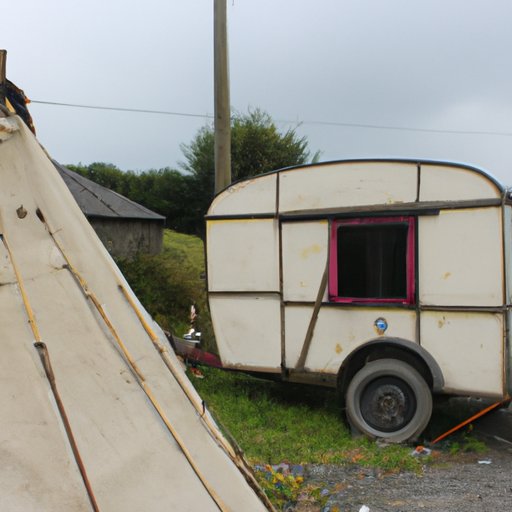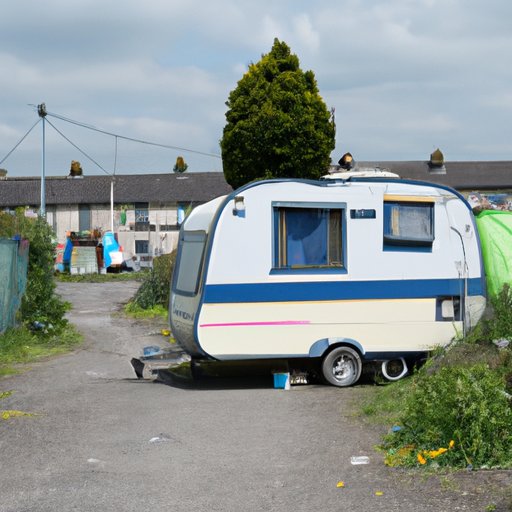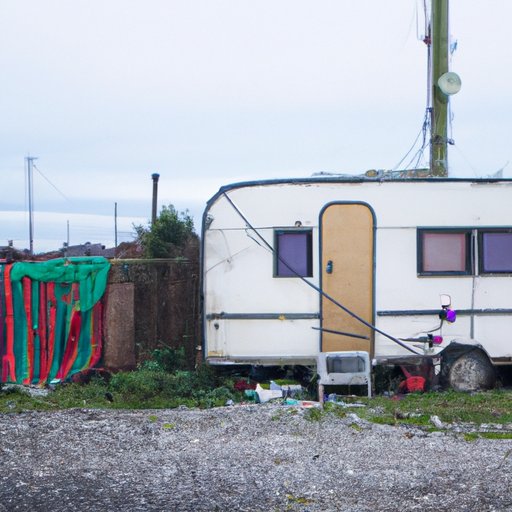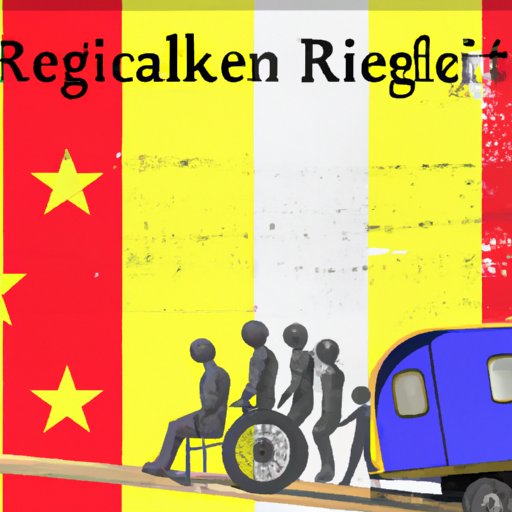Introduction
Irish Travellers are a nomadic ethnic group native to Ireland that has existed for centuries. They are distinct from the settled population, with their own language, traditions, and customs. The purpose of this article is to explore the history, culture, and challenges facing the Irish Traveller community both in Ireland and abroad.
A Historical Overview of Irish Travellers
The earliest records of Irish Travellers date back to the 1500s, when they were referred to as “tinkers” or “itinerants”. They were known for their metalwork and horse trading, but also for their nomadic lifestyle. Over time, the term “tinker” became derogatory, and the preferred term for the group is now “Irish Travellers”.
Pre-20th Century History
In the 19th century, Irish Travellers began to settle in areas such as Dublin, where they established market stalls. Many of them worked in the road repair industry, as well as in the construction and agricultural sectors. In the early 20th century, the Irish government passed legislation banning the nomadic lifestyle of Irish Travellers, forcing them to settle in permanent homes.
20th and 21st Century History
In the late 20th century, Irish Travellers began to regain their nomadic roots, although the majority still live in permanent homes. Irish Travellers have become increasingly visible in recent years, particularly in the media, where they are often portrayed in a negative light. This has led to an increase in discrimination and prejudice against the community.
The Social and Political Struggles of Irish Travellers
Irish Travellers face numerous social and political challenges, particularly in terms of discrimination in education and employment, and lack of representation in politics. These issues have been exacerbated by misconceptions and stereotypes perpetuated by the media.
Discrimination in Education and Employment
Irish Travellers face significant barriers to accessing education and employment opportunities. According to a report by the Equality Authority, Irish Travellers experience higher rates of unemployment than the general population, and are more likely to be underemployed and underpaid. Furthermore, research has found that Irish Travellers are less likely to complete secondary school and university than their non-Traveller peers.
Lack of Representation in Politics
Irish Travellers are largely excluded from the political process, with no elected representatives in either the national or local governments. This lack of representation means that Irish Travellers’ voices are not heard in decision-making processes, and their needs and concerns are not taken into account.
Challenges for Irish Travellers in Ireland and Abroad
Irish Travellers also face discrimination and prejudice in other countries, particularly in the United Kingdom, where they are often denied access to public services, housing, and employment. In addition, they are often victims of hate crimes and racial profiling.

Exploring the Culture and Traditions of Irish Travellers
Irish Travellers have their own distinctive culture and traditions. These include traditional music and dance, their own language and dialects, and a unique cuisine.
Traditional Music and Dance
Irish Travellers are renowned for their lively traditional music and dance. They often perform at festivals and events, and some of their songs have become popular in the mainstream. According to Robert Dunbar, professor of Irish Studies at University College Dublin, “the music of the Travellers is an expression of their identity and culture, and it serves to bind them together as a community.”
Language and Dialects
Irish Travellers have their own language and dialects, which are derived from a mixture of English and Irish Gaelic. There is also a distinct Traveller vocabulary, which includes words and phrases that are not used by the settled population.
Food and Cuisine
Irish Travellers have a unique cuisine that reflects their nomadic lifestyle. Dishes such as stew, fried bread, and potatoes are cooked over open fires and shared among family and friends.
Examining the Education and Employment Challenges Faced by Irish Travellers
Irish Travellers face numerous challenges when it comes to accessing education and employment opportunities. These include limited access to education, low employment rates, and barriers to professional advancement.
Limited Access to Education
Irish Travellers experience high levels of educational disadvantage due to discrimination, poverty, and lack of access to resources. According to a report by the Central Statistics Office, only 5% of Irish Travellers aged 15-24 had completed third level education, compared to 33% of the general population.
Low Employment Rates
Irish Travellers have significantly lower employment rates than the general population. According to a report by the Equality Authority, only 29% of Irish Travellers were employed in 2011, compared to 69% of the general population.
Barriers to Professional Advancement
Irish Travellers also face numerous barriers to professional advancement, including discrimination and lack of access to resources. Research has found that Irish Travellers are less likely to receive promotions and pay rises than their non-Traveller peers.

How the Irish Traveller Community is Adapting to Modern Society
Despite the challenges faced by Irish Travellers, the community is adapting to modern society in a variety of ways. These include embracing technology, advocating for rights and representation, and engaging with the settled population.
Embracing Technology
Irish Travellers have embraced technology in recent years, using it to connect with family and friends, access information, and promote their culture. For example, in 2010, the Irish Traveller Movement launched a website to provide information about the community and raise awareness of the issues they face.
Advocating for Rights and Representation
Irish Travellers have also become more vocal in advocating for their rights and representation in recent years. Organisations such as Pavee Point and the Irish Traveller Movement have been working to raise awareness of the issues faced by the community and lobby for change.

An Exploration of the Relationship Between Irish Travellers and the Mainstream Population
Although Irish Travellers have experienced discrimination and prejudice from the mainstream population, there have been efforts to bridge the divide between the two groups. This includes initiatives to promote dialogue and understanding, as well as projects to promote intercultural exchange.
Misconceptions and Stereotypes
Misconceptions and stereotypes about Irish Travellers are widespread in the mainstream population. These include stereotypes of criminality and anti-social behaviour, which are often perpetuated by the media.
Building Bridges Through Interaction
In recent years, there have been efforts to build bridges between Irish Travellers and the mainstream population through dialogue and interaction. For example, in 2017, the Irish Traveller Movement launched a project called “Cultural Connections”, which aims to promote understanding and collaboration between the two communities.

Investigating the Impact of Discrimination on Irish Travellers
Discrimination has had a significant impact on Irish Travellers, particularly in terms of systemic inequality and its effects on mental health and wellbeing.
Systemic Inequality
Irish Travellers experience systemic inequality, with discrimination in education, employment, and access to services. This has resulted in higher levels of poverty and poorer health outcomes for the community.
Effects on Mental Health and Well-Being
Discrimination and prejudice can also have a negative effect on Irish Travellers’ mental health and wellbeing. Research has found that Irish Travellers experience higher levels of depression, anxiety, and suicide than the general population.
Conclusion
This article has explored the history, culture, and challenges of the Irish Traveller community. It has examined systemic inequality, discrimination in education and employment, and the impact of these issues on mental health and wellbeing. Irish Travellers have also been shown to be adapting to modern society, embracing technology, advocating for rights and representation, and engaging with the settled population. Although Irish Travellers have experienced discrimination and prejudice from the mainstream population, there have been efforts to bridge the divide between the two groups. Finally, it is clear that discrimination has had a significant impact on Irish Travellers, particularly in terms of systemic inequality and its effects on mental health and wellbeing.
Summary of Key Points
This article has explored the history, culture, and challenges of the Irish Traveller community. It has examined systemic inequality, discrimination in education and employment, and the impact of these issues on mental health and wellbeing. Irish Travellers have also been shown to be adapting to modern society, embracing technology, advocating for rights and representation, and engaging with the settled population. Finally, it is clear that discrimination has had a significant impact on Irish Travellers.
Call to Action
It is important that we recognise the struggles faced by Irish Travellers and take steps to address systemic inequality and combat discrimination. We must also strive to foster understanding and collaboration between the Irish Traveller community and the mainstream population, in order to create a more inclusive and equitable society.
(Note: Is this article not meeting your expectations? Do you have knowledge or insights to share? Unlock new opportunities and expand your reach by joining our authors team. Click Registration to join us and share your expertise with our readers.)
